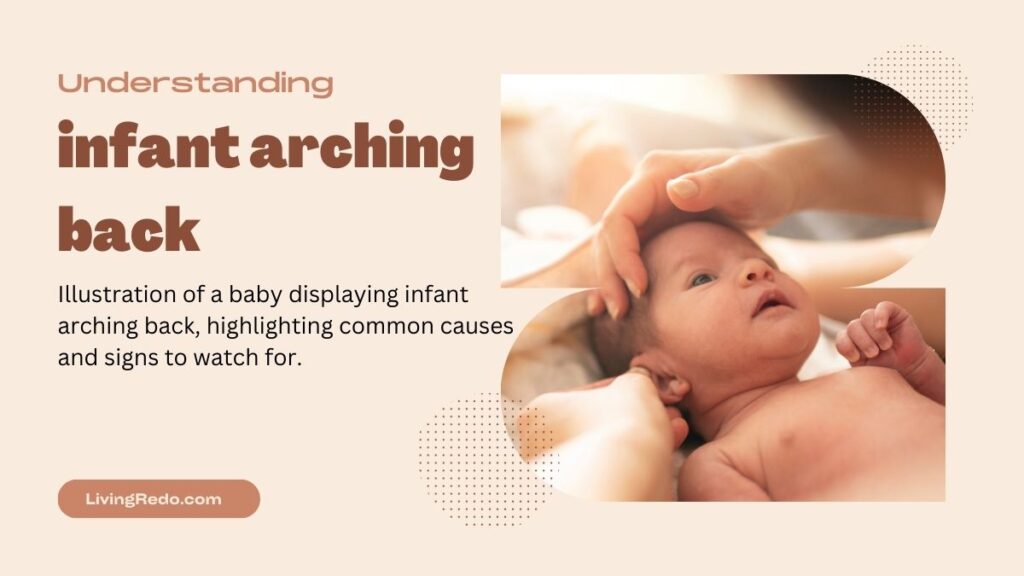Understanding Infant Arching Back Causes
As a new parent, it’s natural to observe every little movement your baby makes. One behavior that might catch your attention is when your infant arches their back. This movement can seem puzzling or even alarming. Is it normal? Should you be worried? Let’s break it down step by step to provide clarity, guidance, and peace of mind.
What Is Infant Arching Back?
Infant arching back refers to when a baby bends their body, forming an arch with their back. It might happen during feeding, lying down, or even when they’re being held. Sometimes, it’s a completely normal reflex. Other times, it could signal discomfort or an underlying issue that requires attention.
Why Do Babies Arch Their Backs?
There are several reasons why an infant arches their back. Let’s explore the most common ones:
1. Normal Reflexes or Movements
Babies are still learning how to control their bodies. Arching their backs might be part of their natural developmental process.
- Learning to Roll Over: As your baby grows, they’ll practice rolling over. Arching their back can be an attempt to initiate this movement.
- Startle Reflex: Sometimes, babies react to loud sounds or sudden movements by stiffening their bodies, which might include arching.
2. Discomfort or Pain
Babies can’t talk, so they express discomfort through body language. Arching their back is one way to communicate.
a. Gas or Colic
- Babies often experience gas or colic, especially in the first few months. Arching the back could be their way of trying to relieve the discomfort.
- Pro Tip: Gently burp your baby after feeding or try baby massage techniques to ease gas.
b. Acid Reflux (GERD)
- If your baby arches their back while crying after feeding, it might indicate acid reflux. This happens when stomach contents flow back into the esophagus, causing discomfort.
- Consider adjusting feeding positions or consulting your pediatrician for guidance.
3. Emotional Expression
Babies use their bodies to express emotions:
- Frustration: When babies feel overwhelmed or overstimulated, they might arch their backs to show frustration.
- Avoidance: During tummy time, some babies arch their backs to signal they’ve had enough.
4. Medical Concerns
In rare cases, infant arching back can be a sign of a medical condition.
a. Neurological Issues
- Conditions like cerebral palsy or infantile spasms might cause excessive back arching.
- Watch for other symptoms like stiffness, unusual movements, or developmental delays.
b. Sandifer Syndrome
- This rare condition combines acid reflux with unusual postures, like back arching.
If you suspect anything unusual, consult a healthcare provider for a proper evaluation.
A Mother’s Story: Understanding Back Arching
When Sarah’s three-month-old baby, Mia, started arching her back after every meal, she was worried. At first, she thought Mia was simply stretching. But after a few days, she noticed her baby crying during feedings too. Sarah reached out to her pediatrician, who diagnosed Mia with mild acid reflux. A few adjustments to Mia’s feeding routine—keeping her upright after meals and smaller, more frequent feedings—helped solve the problem.
This story shows that while back arching might seem alarming, simple solutions often resolve the issue.
When Should You Worry?
Occasional back arching is normal. However, certain signs mean you should seek medical advice:
- Frequent or Intense Arching: Happens multiple times a day and seems uncontrollable.
- Crying During Arching: If the baby cries excessively, especially after feeding.
- Feeding Difficulties: Refusal to feed or spitting up frequently.
- Other Symptoms: Developmental delays, stiffness, or unusual postures.
Step-by-Step Solutions for Back Arching
Here’s how you can help your baby if they’re arching their back:
1. Observe and Note Patterns
- Does the arching happen during or after feeding?
- Is it accompanied by crying or spitting up?
2. Address Feeding Issues
- Burp your baby frequently during feeds.
- Experiment with different feeding positions. For instance, keeping your baby upright can help prevent reflux.
3. Try Comforting Techniques
- Massage: Gently massage your baby’s tummy to relieve gas.
- White Noise: Use calming sounds to soothe overstimulation.
4. Visit Your Pediatrician
If back arching persists or worsens, a pediatrician can evaluate for underlying issues like GERD or neurological concerns.
Products That Can Help
If your baby frequently arches their back due to issues like gas or reflux, these products might help:
- Baby Feeding Pillow
- Keeps the baby in an upright position during feeding.
- Anti-Colic Bottles
- Designed to reduce air intake during feeding.
- Baby Massage Oil
- Perfect for gentle tummy massages to ease gas discomfort.
Explore Baby Comfort Products Now
FAQs
Conclusion
Infant arching back is a behavior that can have many causes, ranging from normal developmental movements to signs of discomfort or medical concerns. The key is to observe your baby’s patterns, address potential triggers like feeding issues, and seek medical advice when needed.
Remember, Parenting is an educational experience. By understanding your baby’s body language, you can provide the care they need and build a strong bond.
For more tips on baby care, visit HealthyChildren.org.

